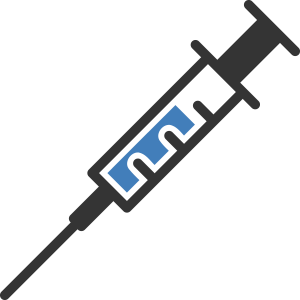Vaccinations

Staying up-to-date on your vaccination schedule can help protect you, your family, and your community from communicable diseases. At Infectious Disease Center our highly trained team provides all standard vaccinations to adults. Walk-in visits make it easy to get immunizations promptly. You can also schedule visits by calling the nearest office today.
Vaccinations Q&A
What are vaccinations?
Vaccinations, or immunizations, are preventive treatments that trigger your immune system’s natural ability to ward off infectious diseases.
The immune system protects your body against foreign pathogens, such as viruses, bacteria, and toxins. By activating your immune system, vaccines can help prevent the spread of disease at home and within your community.
How do vaccinations work?
Vaccinations introduce a small amount of a weakened or dead pathogen into your body. Once your immune system recognizes the pathogen, it activates when it comes in contact with that virus again to prevent infection. As a result, vaccines can prevent you from contracting certain communicable diseases or significantly reduce your symptoms.
What are the most common vaccinations?
Several vaccinations exist to protect you from potentially serious diseases and infectious viruses. The most common vaccines include:
- Influenza (Flu)
- Varicella (Chickenpox)
- Diphtheria
- Hepatitis A and B
- Haemophilus influenzae type b (Hib)
- Measles
- Human papillomavirus (HPV)
- Meningococcal
- Pneumococcal
- Mumps
- Rotavirus
- Poliomyelitis (Polio)
- Rubella
- Herpes Zoster (Shingles)
- Pertussis (Whooping cough)
- Tetanus
- COVID-19
Some vaccinations require multiple doses to work effectively. Others need booster shots to continue protecting themselves throughout life.
The Centers for Disease Control and Prevention (CDC) also recommends certain vaccines, such as those that protect against smallpox, cholera, rabies, and typhoid fever, before you travel abroad.
How often do I need vaccinations?
During childhood and early adolescence, your child may need multiple rounds of vaccinations. By adulthood, however, vaccination schedules are not as regular.
The CDC recommends that every adult receive the annual flu vaccine once a year. All adults also need a Tdap (tetanus, diphtheria, and pertussis) vaccine once every 10 years.
Why are vaccinations important?
Many vaccinations protect you and your family against diseases that currently have no cure, such as polio. Without vaccines, these diseases and viral infections can cause severe complications, such as respiratory problems or loss of muscle function.
Vaccines also minimize the spread of disease within communities and around the world to prevent international epidemics. As people continue to seek immunizations, it diminishes the virus’ ability to find new hosts.
